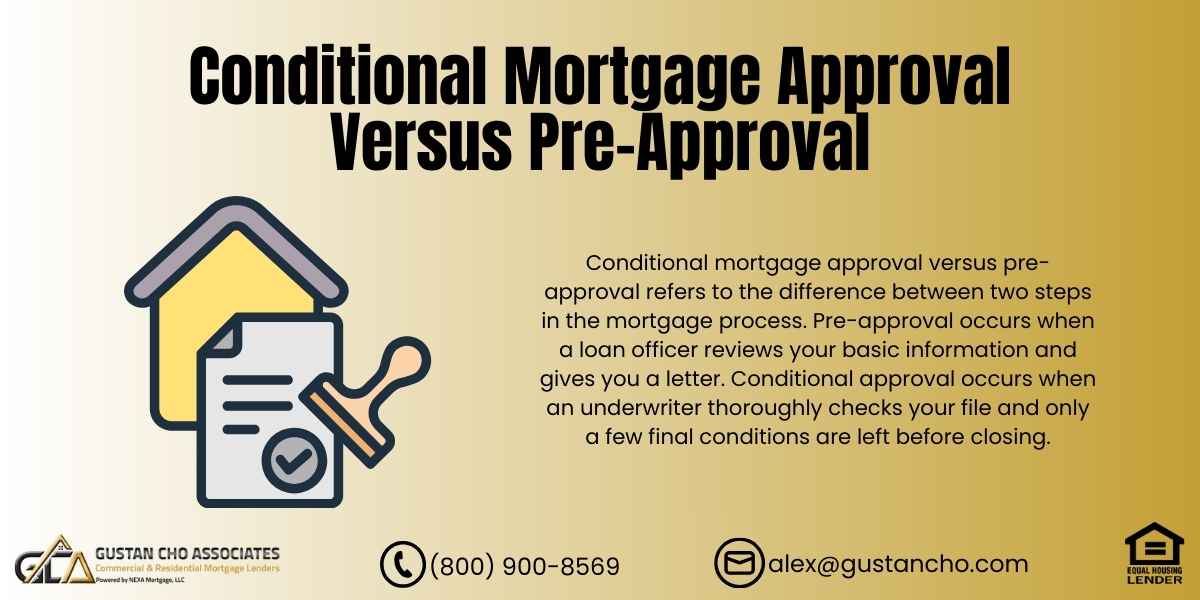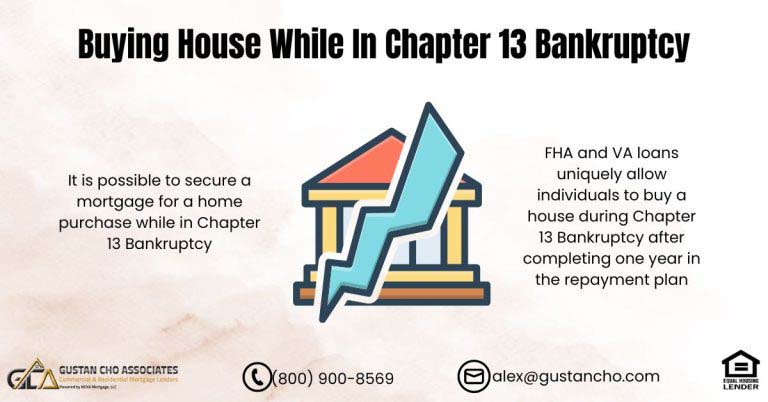Conditional Mortgage Approval Versus Pre-Approval: What Borrowers Need to Know in 2025
Buying a home is super exciting, but the mortgage process can be overwhelming if you’re unclear on what all the terms mean. One of the biggest things that trips up homebuyers is understanding the difference between conditional mortgage approval and pre-approval.
At first glance, they sound the same. But the truth is, these two approvals carry very different weight when making an offer, getting your loan cleared, and closing on time. If you’re shopping for a house in 2025, knowing the difference could mean the difference between having your loan close smoothly—or hitting last-minute roadblocks.
At Gustan Cho Associates, we specialize in helping borrowers who were denied elsewhere or stressed out by unclear approvals. In this guide, we’ll break down conditional mortgage approval versus pre-approval, show you why it matters, and explain how you can set yourself up for success when buying or refinancing your home.
What Is a Pre-Approval in the Mortgage Process?
A pre-approval is the first green light you get in the mortgage process. It’s a letter that shows a lender has reviewed your credit, income, and debts and believes you qualify for a certain loan amount.
Most pre-approvals are issued by loan officers based on the documents you provide. This step is critical if you’re starting to shop because sellers and real estate agents want proof that you’re a serious buyer.
But here’s the catch: not all pre-approvals are created equal. Some lenders do a light review and issue pre-approvals quickly, but they haven’t yet been signed off by an underwriter. That means there’s still a chance your loan could get denied later if issues come up.
Understand Conditional Approval vs Pre-Approval
Learn which mortgage option works best for your home purchase.
What Is a Conditional Mortgage Approval?
A conditional mortgage approval goes a step further. It means an actual mortgage underwriter has thoroughly reviewed your application, documents, and credit file. Instead of just a surface-level review, this is a deep dive into your qualifications.
The underwriter issues an approval with certain “conditions” that must be cleared before closing. These conditions are usually straightforward, such as:
- Updated pay stubs or bank statements.
- Verification of employment.
- Verification of rent.
- Proof of down payment funds.
- Explanations for large deposits, credit inquiries, or past credit issues.
- An appraisal that supports the home’s value.
Once you meet these conditions, you move to the final step: clear to close.
Conditional Mortgage Approval Versus Pre-Approval: What’s the Difference?
Here’s the key distinction:
- Pre-Approval = A loan officer says you look good for a mortgage based on a quick review.
- Conditional Approval = An underwriter has already reviewed your file and signed off, with only a few conditions left to clear before you close.
Consider the analogy that compares a pre-approval in the mortgage process to a doctor’s initial assessment following a brief checkup. In contrast, a conditional mortgage approval is akin to undergoing a comprehensive medical examination with lab results. This highlights the difference in depth and reliability between the two stages of mortgage approval, with the conditional approval providing a more thorough evaluation of your financial situation.
That’s why, when comparing conditional mortgage approval versus pre-approval, conditional approval is far stronger and gives you more confidence when house-hunting.
Why Pre-Approval Alone Isn’t Always Enough
Many borrowers think that once they have a pre-approval letter, they’re good to go. Unfortunately, that’s not always true.
Here’s why:
- Pre-approvals are often based on the information you provide, not what’s fully verified.
- If your credit score changes, new debts appear, or income documentation doesn’t match what you shared, your pre-approval can fall apart.
- This is one of the top reasons buyers face last-minute mortgage denials—a devastating blow when you’ve already invested time and money in inspections and appraisals.
At Gustan Cho Associates, we’ve seen too many borrowers come to us after being denied because their original lender didn’t dig deep enough during pre-approval. That’s why we only issue full conditional mortgage approvals.
Get the Right Mortgage Approval Type
Avoid surprises and choose the approval that strengthens your offer.
Why Conditional Mortgage Approval Is More Powerful
When it comes to conditional mortgage approval versus pre-approval, conditional approval wins every time. Here’s why:
- Stronger for Sellers – In a competitive housing market, sellers want serious buyers. A conditional approval shows that you’ve already passed underwriting, making your offer stronger than buyers with only a basic pre-approval.
- Less Stress – Since most heavy lifting is done up front, you avoid last-minute surprises. You know exactly what conditions remain and can plan to meet them.
- Faster Closings – With underwriting already completed, you can move to clear-to-close much faster once conditions are met. That helps you meet deadlines and avoid contract extensions.
- Confidence for You – You can house-hunt with peace of mind, knowing you’re not just “pre-approved” but conditionally approved by an underwriter.
Real-Life Examples of Conditions
To better understand conditional mortgage approval versus pre-approval, here are some real-world examples of conditions you might see:
- Providing a recent bank statement to verify you still have enough funds for your down payment.
- Supplying a letter of explanation for a recent credit inquiry.
- Showing proof that a student loan is in deferment.
- Getting a homeowner’s insurance binder before closing.
- Clearing a small overdraft fee shown on your bank account.
These conditions aren’t meant to scare you—they’re just final steps lenders need to document before funding your loan.
Step-by-Step: From Pre-Approval to Clear to Close
- Pre-Approval – You apply with a lender, provide basic income, credit, and asset info, and get a pre-approval letter.
- Conditional Mortgage Approval – Your loan file is fully underwritten. You get a list of conditions to satisfy.
- Clear to Close – Once you submit the final documents and the underwriter clears conditions, your loan is fully approved.
- Closing Day – The lender wires funds, you sign papers, and you officially become a homeowner.
Why Gustan Cho Associates Only Issues Conditional Approvals
At Gustan Cho Associates, we know how stressful the mortgage process can be. Over 75% of our borrowers come to us after being denied elsewhere or frustrated with lenders who issued weak pre-approvals.
That’s why we don’t hand out flimsy pre-approval letters. Every approval we issue is a full conditional mortgage approval versus pre-approval that an underwriter has reviewed and signed off.
This is why we close 100% of our pre-approvals—on time, with no surprises.
Updated Insights for 2025 Homebuyers
Mortgage lending continues to evolve, and in 2025, here’s what you should know about conditional mortgage approval versus pre-approval:
- Digital Underwriting: Many lenders now use automated systems that speed up conditional approvals. However, human underwriters still play a crucial role in reviewing edge cases.
- New Credit Scoring Models: With FICO 10T and VantageScore 4.0 rolling out, lenders review credit differently. A conditional approval helps you know exactly how you stand.
- Competitive Housing Market: Sellers in hot markets often prefer offers backed by conditional approvals because they are less likely to fall through.
Final Thoughts on Conditional Mortgage Approval Versus Pre-Approval
When deciding between conditional mortgage approval versus pre-approval, the choice is clear: conditional approval gives you more strength, more confidence, and a smoother path to closing.
Don’t risk last-minute denials or contract delays with a weak pre-approval. Work with a lender like Gustan Cho Associates that issues true conditional approvals up front.
Borrowers who need a five-star national mortgage company licensed in 50 states with no overlays and who are experts on conditional mortgage approval versus pre-approval, please contact us at 800-900-8569, text us for a faster response, or email us at alex@gustancho.com. We’re here 7 days a week, evenings, weekends, and holidays to help you get the strongest approval possible—so you can shop for your dream home with confidence.
Conditional Approval or Pre-Approval? Know Before You Buy
Protect your homebuying plans with the right mortgage approval.
Frequently Asked Questions About Conditional Approval Versus Pre-Approval:
Q: What Does Conditional Mortgage Approval Versus Pre-Approval Mean?
A: Conditional mortgage approval versus pre-approval refers to the difference between two steps in the mortgage process. Pre-approval occurs when a loan officer reviews your basic information and gives you a letter. Conditional approval occurs when an underwriter thoroughly checks your file and only a few final conditions are left before closing.
Q: Which is Stronger: Conditional Mortgage Approval Versus Pre-Approval?
A: Conditional mortgage approval is much stronger because it’s been signed off by an underwriter. Pre-approval is good for starting your home search, but conditional approval gives you more confidence when making an offer.
Q: Why do Sellers Care About Conditional Mortgage Approval Versus Pre-Approval?
A: Sellers see conditional mortgage approval as a safer bet. It shows the buyer has already gone through underwriting and is more likely to close. A basic pre-approval doesn’t carry the same weight in a competitive market.
Q: Can Conditional Mortgage Approval Still be Denied?
A: Yes, a loan can still fall through after conditional approval if you don’t meet the underwriter’s conditions. But it’s much less likely compared to pre-approval because most of the review has already been done.
Q: How Long Does it Take to Get Conditional Mortgage Approval Versus Pre-Approval?
A: Pre-approval can be done in a day or two since it’s just a quick review. Conditional approval usually takes longer because an underwriter carefully checks all your documents. The extra time is worth it for a stronger approval.
Q: Do All Lenders Give Conditional Mortgage Approval Versus Pre-Approval?
A: Not all lenders issue conditional approvals up front. Many only give out pre-approvals. At Gustan Cho Associates, all our pre-approvals are full conditional mortgage approvals, so buyers have the strongest start.
Q: What Conditions are Part of Conditional Mortgage Approval Versus Pre-Approval?
A: Common conditions include updated bank statements, pay stubs, employment verification, appraisal results, or letters explaining credit inquiries. These are normal steps before you get your final “clear to close.”
Q: When Should I Get Conditional Mortgage Approval Versus Pre-Approval?
A: You should start with pre-approval when you’re just beginning your home search. But as soon as you’re serious about buying, it’s smart to get conditional mortgage approval so you’re ready to make a strong offer.
Q: Is Conditional Mortgage Approval Better for Refinancing, Too?
A: Yes. If you’re refinancing, conditional approval is more reliable because the underwriter has already reviewed your whole file. This helps avoid delays and surprises compared to a basic pre-approval.
Q: Why Does Gustan Cho Associates Focus on Conditional Mortgage Approval Versus Pre-Approval?
A: Too many borrowers get denied at the last minute with weak pre-approvals from other lenders. At Gustan Cho Associates, we only issue conditional approvals so our borrowers can close on time with peace of mind.
This article about “Conditional Mortgage Approval Versus Pre-Approval” was updated on August 20th, 2025.
Secure Your Home with Confidence
Understand the benefits of pre-approval and conditional approval today.










